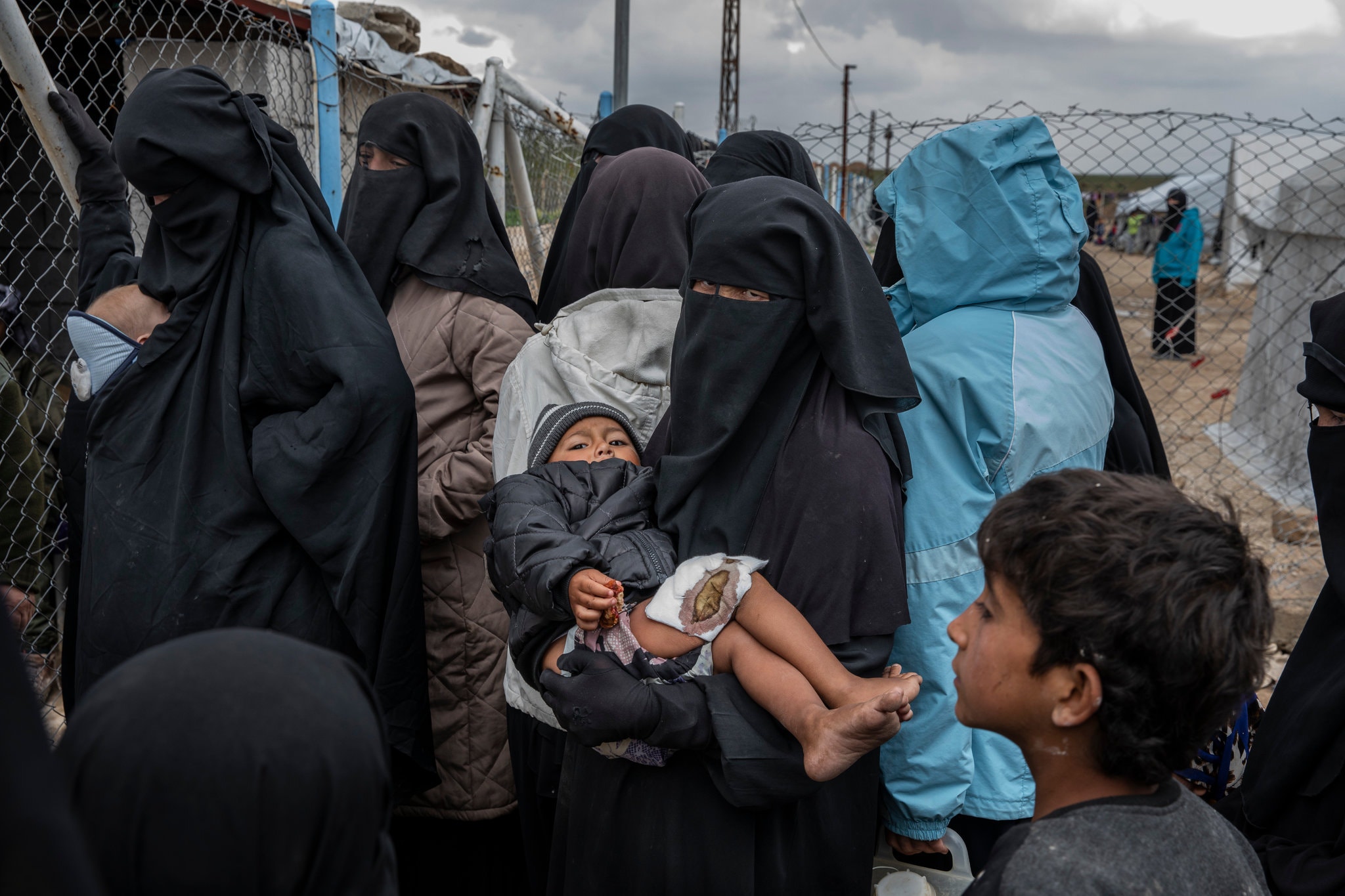The detention camp of al-Hol annex in Northeastern Syria is in a state of dire human rights violations. The conditions show violations of provisions of the Universal Declaration of Human Rights (UDHR), the International Convention on Civil and Political Rights (ICCPR), and the Convention on the Rights of the Child (CRC).[1] Reports have come out assessing the situation in al-Hol and many specifically looking at the annex portion of the detention camp where foreign women and children are being held.[2] The annex holds about 12,000 foreigners and about two-thirds of those are children.[3]
Article 25 of the UDHR states that “everyone has the right to a standard of living adequate for the health and well-being of [themselves] . . . including food, . . . housing and medical care”.[4] Evidence from reports show a complete lack of those standards. These women and children are suffering with a deficient supply of food and drinking-water.[5] In some cases, housing consists of tattered tents with sewage seeping in from overflowing latrines.[6] The medical clinic in the annexed portion of al-Hol has been closed off for days at a time and residents must wait to be escorted to a clinic in another part of the camp.[7] Some women have been forced to give birth in tents without a doctor or mid-wife present.[8]
Evidence also shows violations of provisions contained in the ICCPR. Article 2 obligates states to apply this convention to anyone under its jurisdiction.[9] Thus, this article applies to even the foreigners in the annex of al-Hol. Other substantive provisions include Article 12, a person’s right to the freedom of movement, and Article 14, the right to due process.[10] The detention camp is surrounded by a chain-link fence with armed guards.[11] Thus, this prevents the detainees’ ability to leave violating their right to freedom of movement.[12] The annex women have been denied due process because none of them have been before a judge to give any reason as to why they are being held in the camp.[13]
With two-thirds of the population being children, the situation might be more dire for the children in the annex with added violations to the CRC.[14] Article 6 acknowledges a child’s right to life and a state’s obligation to “ensure to the maximum extent possible” this right to life.[15] From December 2018 until September of this year, almost 340 children have died in al-Hol and most deaths were from preventable diseases.[16] This gives rise to violations of Article 24, which provides children with the right to the “highest attainable standard of health” with access to health services.[17] The CRC also mandates children are provided access to adequate food and clean-drinking water.[18] As stated previously, there is a lack of food and clean drinking-water in al-Hol.[19] A report even described instances of children drinking from worm contaminated water.[20] This is a glaring violation of the right to clean drinking-water.
Further violations of the CRC include the right to education and the obligation of states to “take all appropriate measure to promote physical and psychological recovery… [from] armed conflicts.”[21] Due to the camp’s staggering increase in detainees, from about 9,000 in December 2018 to more than 70,000 by the end of March 2019, al-Hol’s resources are strained.[22] Consequently, children do not have access to education and no services are being provided for the recovery from the fight against ISIS, both physical and emotional.[23]
There does not seem to be much hope in the near future for the fate of the women and children in al-Hol. With resources already running thin, the United States withdrawing support and troops from Syria, Turkey’s insurgence into Syria weakening Kurdish forces, and countries refusing to take back their nationals, resources will only diminish.[24] We can only hope nations wake up to address the dire needs of these women and children and without delay.
- G.A. Res. 217 (III) A, Universal Declaration of Human Rights (Dec. 10, 1948) [hereinafter UDHR]; Convention on the Rights of the Child, Nov. 20, 1989, 1577 U.N.T.S. 3 [hereinafter CRC]; International Covenant on Civil and Political Rights, Dec. 16, 1966, 999 U.N.T.S. 171 [hereinafter ICCPR]. ↑
- Neil Collier & Ben Laffin, After Turkish Incursion, ISIS Wives Speak Out, N.Y. Times, (Oct. 24, 2019), https://www.nytimes.com/2019/10/24/video/syria-isis-turkey-kurds.html; Ben Hubbard, In a Crowded Syria Tent Camp, the Women and Children of ISIS Wait in Limbo, N.Y. Times, (Mar. 29, 2019), https://www.nytimes.com/2019/03/29/world/middleeast/isis-syria-women-children.html; Vivian Yee, Thousands of ISIS Children Suffer in Camps as Countries Grapple With Their Fate, N.Y. Times, (May 8, 2019), https://www.nytimes.com/2019/05/08/world/middleeast/isis-prisoners-children-women.html; Syria: Dire Conditions for ISIS Suspects’ Families, Hum. Rts. Watch, (July 23, 2019), https://www.hrw.org/news/2019/07/23/syria-dire-conditions-isis-suspects-families [hereinafter Dire Conditions]; Letta Tayler, Fear Grips Women and Children Trapped in Syria Camps, Hum. Rts. Watch (Oct. 18, 2019), https://www.hrw.org/news/2019/10/18/fear-grips-women-and-children-trapped-syria-camps. ↑
- Hubbard, supra note 2. ↑
- UDHR, supra note 1, art. 25(1). ↑
- Tayler, supra note 2. ↑
- Dire Conditions, supra note 2. ↑
- Tayler, supra note 2. ↑
- Dire Conditions, supra note 2. ↑
- ICCPR, supra note 1, art. 2. ↑
- Id. art. 12, 14. ↑
- Hubbard, supra note 2. ↑
- Dire Conditions, supra note 2. ↑
- Id. ↑
- Hubbard, supra note 2. ↑
- CRC, supra note 1, art. 6(1), (2). ↑
- Tayler, supra note 2. ↑
- CRC, supra note 1, art. 24(1). ↑
- Id. art. 24(2)(c). ↑
- Tayler, supra note 2. ↑
- Dire Conditions, supra note 2. ↑
- CRC, supra note 1, art. 28, 39. ↑
- Hubbard, supra note 2. ↑
- Id. ↑
- Collier & Laffin, supra note 2; Hubbard, supra note 2; Tayler, supra note 2. ↑


